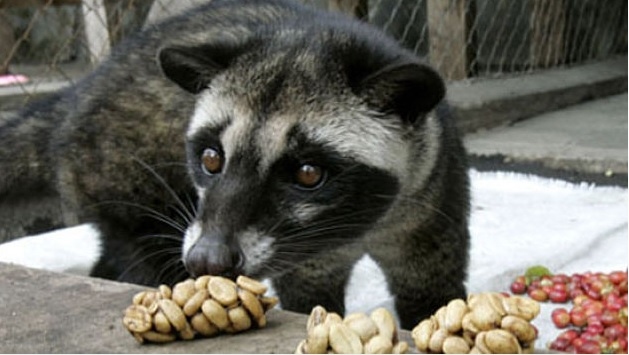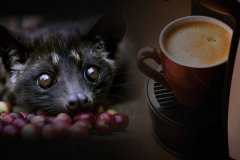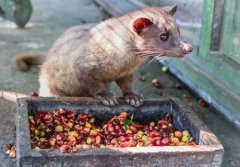Vietnam Kopi Luwak Yunnan Baoshan civet coffee Kopi Luwak brewing method diagram

For professional baristas, please follow the coffee workshop (Wechat official account cafe_style)
Coffee has now entered the homes of ordinary people and has become a popular drink after tea. It is inconceivable that some of the best products in coffee are the poop of some animals, which can be called "poop coffee". Some people jokingly say that "poop coffee" is "the invention of poor coffee farmers". These poop coffees mainly include "Kopi Luwak", "Elephant dung Coffee" and "Bird poop Coffee".
Kopi Luwak
In recent years, a magical variety of coffee has emerged in the international coffee market, which is highly sought after by coffee enthusiasts. The price of this kind of coffee is dozens of times that of regular coffee, or even three times that of the famous coffee product, 2Murray of Jamaica Blue Mountain Coffee in North America. This kind of coffee is produced in Lujiang Town, Lujiang Town, Longyang District, Baoshan City, Yunnan Province, China. It is civet coffee, or Kopi Luwak.
The coffee in Miankang Village has become one of the most expensive coffee in the world because it has a unique processing process and is rare in quantity.
Traditional coffee fruits are washed or tanned to remove the peel, pulp and sheep skin, and finally remove the core-that is, coffee beans. The coffee is made by fermenting the intestines and stomach of wild civets.
The civet swallows the coffee fruit and can only digest the skin and pulp. Coffee beans are indigestible and are eventually excreted through feces. After people clean and roast the coffee beans, they get top coffee with a special taste.
Lujiangba, where Lukang Village is located, is located at the eastern foot of Gaoligong Mountain, which is very suitable for the growth of Arabica small coffee. This kind of small-grain coffee tree is planted in a large area on the mountain of 1100m, 1450m above sea level in Lujiang. The coffee made from this kind of coffee beans is famous all over the world for its unique excellent quality. it was rated as first-class in the London market at the end of 1950s and won the laudatory name of "Lujiang No.1". It is the coffee with the least caffeine, the least bitter taste and the best aroma in the world.
In fact, the origin of the Kopi Luwak Initiative is not in China, but in Indonesia. The "Nuwak" coffee there used to be the most expensive coffee in the world, and the mysterious recipe for this unique coffee also comes from the droppings of a civet cat, the coconut cat.
The coconut cat is a close relative of the domestic cat, locally known as "Nouak". It is an arboreal omnivore, withdrawn by nature and likes to walk at night. When foraging at night, through its keen sense of smell, it only chooses the most mature, sweet, full and juicy coffee fruit in the coffee tree to eat. The coffee fruit passes through its digestive system, which not only destroys the bitter protein, which greatly reduces the bitterness, but also increases the round taste and increases the ratio of malic acid, citric acid, cellulose sugar and pyroglutamic acid in the coffee.
Coupled with the careful baking of the barista, it finally gained an amazing charm, and its price also went up. In April 2008, the coffee was sold in a department store in London, England, for £50 a cup. In the international market, Nouak coffee has always been a veritable luxury. It ranks first in the world with an initial annual output of only 500 pounds and US $800 per pound.
Indonesian coffee has the taste of earth and traditional Chinese medicine, and its consistency is higher than that of coffee from all continents. But "Kopi Luwak" has a heavier earthy smell and a consistency closer to syrup, which has a special flavor.
The history of the Kopi Luwak can be traced back to the time when the Dutch ruled Indonesia hundreds of years ago. At that time, as a result of the colonists' ban on coffee cultivation, the local aborigines could only find undigested coffee beans from the droppings of forest animals, washed, roasted and drunk, which was called "Kopi Luwak". It was also a tribute from Indonesia to the Dutch royal family.
Important Notice :
前街咖啡 FrontStreet Coffee has moved to new addredd:
FrontStreet Coffee Address: 315,Donghua East Road,GuangZhou
Tel:020 38364473
- Prev

What is Kopi Luwak? "Natural fermentation" achieves the unique flavor of Musk Kopi Luwak.
Professional barista communication please follow the coffee workshop (Wechat official account cafe_style) what is Kopi Luwak? You are no stranger to Kopi Luwak because of its unique flavor and rich, round, sweet taste, which makes this coffee very popular, but do you know why Kopi Luwak tastes so good? Pure Kopi Luwak
- Next

Kopi Luwak pictures what is the difference between Kopi Luwak of Vietnam and Kopi Luwak of Indonesia?
Professional barista communication, please follow the coffee workshop (Wechat official account cafe_style) coffee? Cat shit? How can we get together? Well, in fact, after the Indonesian civets ate ripe coffee cherries, the unique environment and enzymes in the stomach contributed to a completely different internal environment from ordinary fermentation, and the pulp was broken down into amino groups that can give coffee beans a unique flavor.
Related
- Detailed explanation of Jadeite planting Land in Panamanian Jadeite Manor introduction to the grading system of Jadeite competitive bidding, Red bid, Green bid and Rose Summer
- Story of Coffee planting in Brenka region of Costa Rica Stonehenge Manor anaerobic heavy honey treatment of flavor mouth
- What's on the barrel of Blue Mountain Coffee beans?
- Can American coffee also pull flowers? How to use hot American style to pull out a good-looking pattern?
- Can you make a cold extract with coffee beans? What is the right proportion for cold-extracted coffee formula?
- Indonesian PWN Gold Mandrine Coffee Origin Features Flavor How to Chong? Mandolin coffee is American.
- A brief introduction to the flavor characteristics of Brazilian yellow bourbon coffee beans
- What is the effect of different water quality on the flavor of cold-extracted coffee? What kind of water is best for brewing coffee?
- Why do you think of Rose Summer whenever you mention Panamanian coffee?
- Introduction to the characteristics of authentic blue mountain coffee bean producing areas? What is the CIB Coffee Authority in Jamaica?

